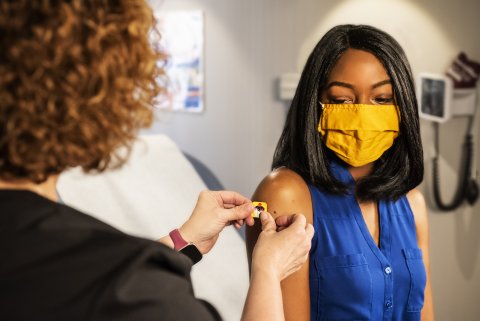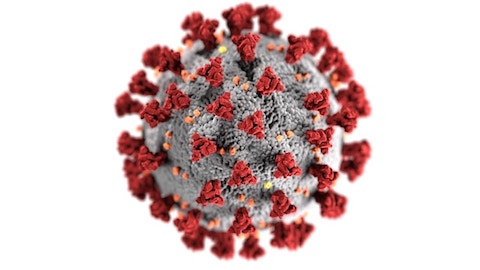
01 Feb Omicron Variant of COVID-19 Should Be Taken Seriously

Dr. Ben Neumann, a lead virologist at Texas A&M University, again discounted the idea that the omicron variant is a milder form of COVID-19 during an Ethnic Media Services briefing Friday. (Screenshot captured by Michael J. Fitzgerald / The CC Pulse)
By Michael J. Fitzgerald
Anecdotal reports indicating the omicron variant of COVID-19 is less dangerous to infected people than earlier strains of the pandemic virus are untrue, according Dr. Ben Neuman, chief virologist at the Global Health Research Complex at Texas A&M University.
Neuman and Dr. Dali Fan, a health science clinical professor at UC Davis, addressed omicron, vaccines and a range of COVID-19 related issues during a one-hour media teleconference Friday sponsored by Ethnic Media Services.
Some of the misinformation about the severity of reactions to infections from the omicron variant can be traced to an early study by the Centers for Disease Control.
That study looked at just six people, concluding omicron might be milder.
But since then, a United Kingdom study of approximately 250,000 people concluded otherwise, Neuman said.
“There is no meaningful difference,” he said. “Omicron is just another version of COVID. And it hits people about as hard.”
Any noted differences might be due to preexisting immunity and/or vaccinations, Neuman noted. “We know those things can protect.”
Fan said lower mortality and hospitalization rates associated with omicron are based on a base of the current high vaccination rates compared with earlier infections in which non-vaccinated people were contracting COVID-19.
“It’s really comparing two different things,” he said. But it also makes the case for getting vaccinated.
Fan predicted that the current surge of omicron cases would continue for a few weeks. But he said that it could start to lessen by early February.
Neuman cautioned that while a February decline is certainly possible, the data about number of cases and surges across the country might be skewed by problems surrounding testing and reporting of test results.
“I’m not sure how much we can believe the apparent slowing in the number of cases,” Neuman said.
Another factor is that the public’s attention is focused on omicron, but many people in this current COVID-19 surge are actually infected with the delta variant.
“The surge in the western part of the United States is a combination of delta and omicron,” Fan said.
The two researchers also addressed the likelihood of another COVID-19 variant appearing in the future.
“As long as this virus grows, it will change,” Neuman said. “And as it changes it will eventually move beyond the reach of some parts of our immunity. And at that point, at least at a practical level, we have a new variant.”
But what any new variant would be like in terms of infection rate, contagiousness or how serious a threat the human health it might pose would only be a guess at this point, they agreed.
Both stressed the importance of getting vaccinated and discounted the notion that contracting the omicron variant might be beneficial.
Neuman said any immunity gained from contracting the omicron variant is short lived at best.
“There’s no health benefit to catching COVID,” he said. “There’s a price you pay. You can get some immunity. But the price you pay is a very real risk of severe long-term problems in the heart, in the lungs — throughout the body.
“You never really know what you are getting when you get into COVID.”






No Comments